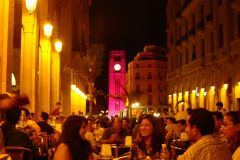 BEIRUT, Lebanon — Fewer restaurants than usual are open, making the narrow street appear dimmer. A staff shortage has owners tending bar, and the menus have thinned.Still, despite the death and destruction wrought by an Israeli offensive against Hezbollah militants, a small and tenacious coterie of war clientele have clung to Beirut’s famed nightlife, hoping for a moment of reprieve from the violence.
BEIRUT, Lebanon — Fewer restaurants than usual are open, making the narrow street appear dimmer. A staff shortage has owners tending bar, and the menus have thinned.Still, despite the death and destruction wrought by an Israeli offensive against Hezbollah militants, a small and tenacious coterie of war clientele have clung to Beirut’s famed nightlife, hoping for a moment of reprieve from the violence.
The fact that the restaurants and bars lining trendy Gouraud Street, a narrow one-way thoroughfare cutting through Beirut’s downtown, are still open and drawing clientele is a testimony to the resilience of a city and a country too painfully accustomed to war.Even at the height of the 1975-1990 civil war, Beirut residents braved militia fighting and Israeli bombing to head to the beach for a dip or to cafes and restaurants for an evening meal.While the conflict now is different, the expressions they wear on their faces are eerily reminiscent of those worn by Lebanese during the earlier war.
At one pub along the street, Sana Taweeleh sits next to her young son, Maxim Abi-Aad, at the long wooden bar dominating the tiny room. The outing was a treat for Abi-Aad, who was spending the weekend with his mother. Taweeleh and her husband are divorced."Do I look happy?" asked Abi-Aad from behind a giant glass of a frothy, pink fruit cocktail. "Well, at least this is better than being bored at home."
Abi-Aad said the summer has been miserable, particularly since the fighting started July 12.
What’s really not cool is that it happened just before my birthday," says the boy, who turns 12 next Sunday.
Taweeleh said her son had trouble sleeping, kept awake by the sound of Israeli bombing of Hezbollah’s stronghold in the southern suburbs. They live in a nearby Christian area.
As she spoke, Michel Ghanem, a 36-year-old divorce lawyer, slid onto the stool next to her. When he overheard her saying she needed milk and medicine to donate to refugees who have fled Israel’s relentless attacks in south Lebanon, he told her he had a friend who runs a charity.
On the other side of the bar, a waiter and a client played Janga, carefully stacking the wooden blocks to form a column. A small television flashed the news that an international conference on the conflict was scheduled in Italy.
Standing behind the cash register, Sharbel Nahed said business was down by about 85 percent. He said the bombing of the nearby Beirut port nearly panicked some of his customers when it happened a few days back.
"They asked for the bill, but when they saw how calm we were, they changed their mind and stayed," he said.
All along Gouraud Street, the scenes are similar, and speak of a country that rebuilt after years of fighting – looking at a future beyond the immediate violence. The restaurants and bars along the street were built during the last couple of years, when hope for Lebanon’s revival was at its height.
Where traffic was congested, valet parking became the norm and reservations were required at many restaurants. But in a telling reminder of its history, the facades of some of the century-old stone buildings that house many of the restaurants still bear some marks of the civil war: bullet holes.
This weekend, the lights that just weeks earlier had been as bright as Lebanon’s future appeared dimmer, with just a half-dozen eateries open. Staff shortages have forced owners to tend bar and, at one pub, a journalist was asked to run the sound system after the DJ failed to show up.
The clientele, usually sticklers for the latest fashion trends, dressed informally. The muted laughter wafting into the street had a brittle edge, the conversations focused on violence. The appetites for food, drink and cigarettes seemed whetted by an undercurrent of apprehension.
At a restaurant down the street from the pub, waiters set juicy steaks, cooked rare, in front of diners. The place was busy, unlike a sushi outlet and a pizza joint nearby.
Amin Younis, who was having a drink with a couple of friends, said he went out to "vent a bit." But unlike many Lebanese, Younis, 36, a coffee shop owner, was optimistic that Lebanon would return to normal. He complained that life was not nearly as fun this weekend as it was before the fighting started.
"We’re just kidding ourselves," he said.
His friend, Sabine Chamaa, a documentary film producer, said she had added jogging to her regimen of swimming to keep fit and relieve tension. Her last documentary was on war-ravaged Bosnia.
"I was interested to see how people lived a war," she said. "Instead of finding answers, I stumbled upon a question: ‘Why is it that humans everywhere like to kill other humans?’"
Nada Abu-Farhat, a star of the Lebanese version of "The Vagina Monologues," said she and her fellow actresses are putting on a "Children’s Monologues" to help cheer up displaced children.
"I hope the play we are working on will allow them to express their feelings and take their mind off their misery," Abu-Farhat said.



